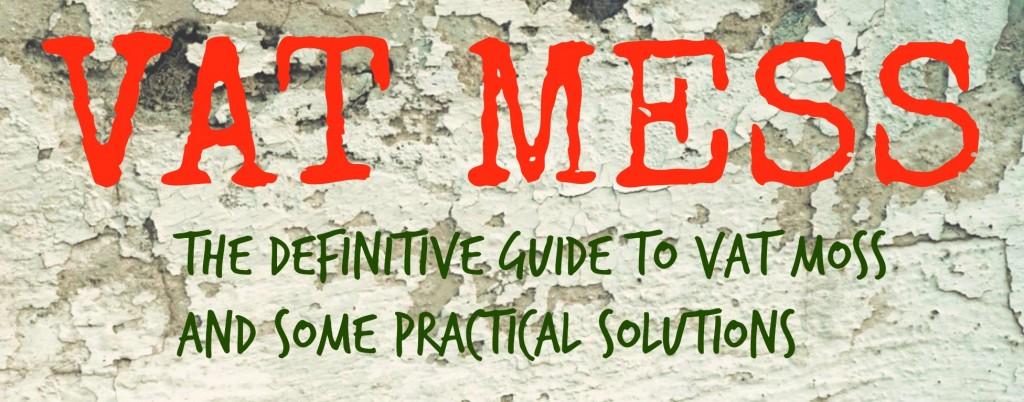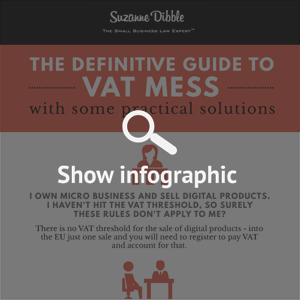
There is something of an uproar in the small business community.
And rightly so.
EU measures are going to make selling outside of the UK into the EU pretty much unworkable for micro businesses selling products or services that are digitally delivered (ie fully automated or involves ‘no or minimal human intervention’).
This includes ebooks, ecourses, webinar recording, videos, software, downloadable resources, music files and images.
Indeed small business owners have gone on the record stating that they aren’t going to launch new products or are even going to close down their business.
And in a time when the UK government is said to be encouraging exports, it seems incomprehensible that a rule could have such an impact on small business owners who are seeking to do just that.
So what’s the problem?
It’s all down to a change to the VAT rules that say that the sale is taxed in the place of supply.
So that means that if someone in Germany purchases your digital file, you need to pay VAT in Germany.
But I’m below the VAT threshold
You may think, aha, I’m a micro business, I haven’t hit the VAT threshold so this doesn’t apply to me.
Not so.
There is no VAT threshold for the sale of digital products.
If you sell digital products worth just 0.01p into Europe, you need to register to pay VAT and account for that.
How on earth do I work out place of supply
Oh yes and you have to work out exactly where your customer is purchasing from (a whole host of issues around identifying the jurisdiction in which VAT is actually payable) and then you have to keep those records safe for at least 10 years so that if the German tax authorities want to come and investigate in 9 and a half years time, you still have all the paperwork and can show that VAT was paid correctly.
As City Am wrote:
“On board transport travelling between different countries in the EU (for example, by boat or train), the consumer location will be the place of departure for the consumer's journey.”
This means a French person travelling from London to Paris by train, having passed through the Channel Tunnel, could purchase an online subscription, connecting to the French mobile network, with a French IP address, and using a French credit card, but it would be correct for VAT purposes to show this as a UK customer. Getting this wrong risks an unlimited fine, even though the VAT rate in both countries is 20 per cent.
On the HMRC Twitter Q&A they stated that we need to obtain and keep on file the following evidence of location:
“Two pieces of non-contradictory evidence such as, for example, IP address, bank account address or SIM card identifier code”.
I’m not sure about you, but my systems are certainly not set up to gather that type of information.
Well I’m going to add a ‘human element’ to get round the rules
You may think aha, I can get round the rules by including human intervention such as a moderated Facebook group and live webinars.
That may be a temporary fix but HMRC have stated that the digital ruling will be extended to physical good and services in the “near future”.
So live training courses, webinars, on-line training with adequate human intervention and the like will ultimately also be subject to these EU VAT regulations.
But b2b sales are excluded, so none of this applies to me.
You might have heard that the new rules don’t apply to b2b sales and think that as you sell solely b2b, this gets you off the hook.
Again not as easy as it sounds.
You have to have evidence that your customer is buying in a business capacity and the only evidence that puts this beyond doubt is a VAT number.
So to safely rely on this exemption you are going to have to put systems in place to track all of your customers VAT numbers.
And what about the ones who aren’t registered for VAT?
Now I do hear on the grapevine that some people who sell b2b have called HMRC and had guidance that even though all of their clients don’t have VAT number, they should be ok to fall outside of this legislation.
However some other people have called and have been told they you need:
- a mandatory tick box for the purchaser to confirm they are purchasing as business, which if deselected will halt the sale and put up an appropriate message
2. to provide their business address
3. to provide a VAT number or if they are not VAT registered then a scan of their letterhead or other company document
So if you do call them up and get guidance that says you should be ok if you only deal b2b even if you don’t have any of the above, then take a careful note and get a name.
You also need to remind your purchasers that they are responsible for paying VAT in their own country.
You might think well in that case I will just block EU sales.
Again, not so simple.
There is a piece of EU legislation (the Services Directive) that says that we must not discriminate against EU consumers of services with regard to their nationality or country of residence.
But we are permitted to treat consumers differently when we have an ‘objective reason’ to do so.
Objective reasons could include additional costs incurred because of the distance involved in delivery, the technical characteristics of the services, specific risks linked to rules and regulations in force in other Member States, different market conditions, such as pricing by different competitors or lack of intellectual property rights.
The guidance states “Unfortunately, it is not possible to say in general terms which reasons really are objective. It requires a case-by-case analysis.” Not very helpful…
But I use third party platforms so I am not responsible for payment of VAT
You may think aha I use Paypal and I have heard that third party platforms are responsible for the payment of VAT.
Sadly not so in the case of Paypal.
As HMRC tweeted:
“Paypal provides payment mechanism; it does not take part in supply of services so it is not responsible for accounting for VAT.”
However there are many third party platform providers who ARE responsible for VAT – see a non exhaustive list of these below but essentially if the sale is made through their platform, they are responsible.
VAT MOSS
HMRC have made it a weeny bit easier for us (bless them…) – they have set up VAT Moss (or VAT Mess as we small business owners like to call it…) which is a one stop shop for us to pay VAT to our European counterparts.
This still doesn’t get us around the issues of determining where our customer is purchasing from and which country to allocate for the VAT payment.
Nor does it get us around the fact that we are going to have to register for VAT and either spend an inordinate amount of time ourselves on this paperwork or pay our accountants a significant amount to work it all out for us.
Nor working out who you need to issue an invoice to and who you don’t
So what are the options for us oppressed small business owners?
- if you only sell B2B, then either set up a system where you can track the address and VAT numbers or call HMRC and try to get them to tell you that the regulations don’t apply to you.
- turn your digital products into a donation based service – good luck with that in terms and conditions of building your business but it will get you outside of the EU VAT rules…
- sell through intermediary platform that will handle sales and be accountable for VAT such as Clickbank, Udemy, Amazon, itunes, Avangate, Cleverbridge, Digital River, Fast Spring, Send Owl– but factor in that these internet giants (who this legislation was actually designed to catch but will ultimately probably be benefiting from it) will be charging you a good % of sales for this service.
- use a software that identifies the customer’s location and applies the correct VAT rate such as Taxamo or a plugin called Easy Digital Downloads or a $20 woo commerce plugin. Xero Accounting are also planning to update their system so that it produces two VAT returns (the normal UK one and the new EU “MOSS” one)
- stop selling digital products – not palatable to the vast majority of us…
- stop selling to the EU on the basis of an objective reason such as it will cost too much for you to comply with this legislation or that your Intellectual Property is not properly protected in the EU. You need to add a warranty to your terms of use that the customer’s place of supply is the UK and preferably also a tick box at the point of order stating that sales are not made to the EU due to intellectual property laws and asking them to tick to confirm that their place of supply is in the UK.
- ignore the legislation and take the risk that you won’t be investigated (not a recommended option due to the unlimited fines you could receive).
- register for VAT in each country in which you make sales (pretty much unworkable for any small business).
- register for VAT and separate out the UK business (where the threshold still applies) and EU business (it has now been confirmed that you do not need two separate companies to do this) and also register for VAT MOSS.
What do HMRC expect to happen?
HMRC states that “VAT MOSS compliance is almost impossible for a micro-business with systems upgrades, data capture, registration as a data controller and the need to provide various formats of invoice in various EU countries. The best solution is to use a 3rd party provider”.
What I’m going to do:
I sell my online Legal Academy to business owners only (b2b) so here is my plan of attack:
- speak to HMRC to get them to go on record to say that as I only sell b2b these rules don’t apply to me.
- If they do that, no more action needed.
- If they won’t do that, I will restrict my sales into the EU on the basis that my IP is not protected outside of the UK and will add a warranty to my terms and a tickbox at the point of order that requires the purchaser to confirm that the place of supply is in the UK.
So what are your thoughts?
What are you going to do? The rules are effective from 1 January 2015. What are you going to do to deal with this legislation? Please let us know in your comments below.
© Suzanne Dibble 2014
Disclaimer: The information contained above is based on English law only and is provided for information purposes only. The contents of this article are not intended to amount to advice and you should not rely on any of the contents of this article. Professional advice should be obtained before taking or refraining from taking any action as a result of the above contents. Suzanne disclaims all liability and responsibility arising from any reliance placed on any of the contents of this article.













